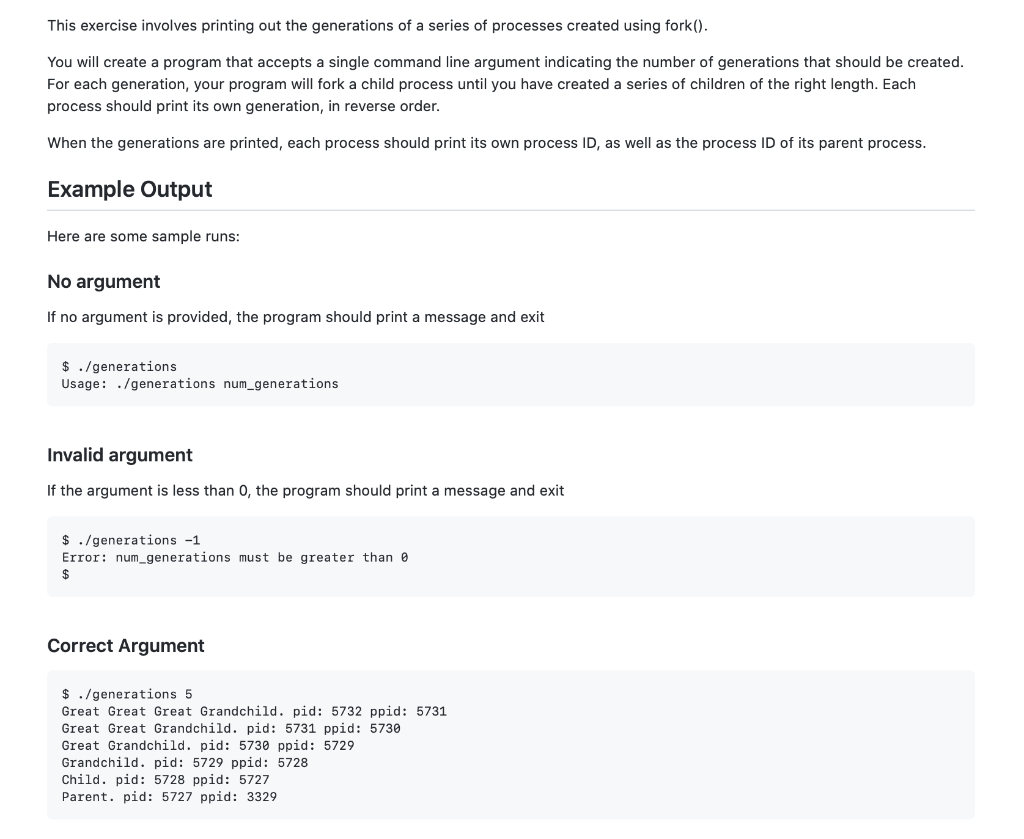You will create a program that accepts a single command line argument indicating the number of generations that should be created. For each generation, your program will fork a child process until you have created a series of children of the right length. Each process should print its own generation, in reverse order. When the generations are printed, each process should print its own process ID, as well as the process ID of its parent process. Example Output Here are some sample runs: No argument If no argument is provided, the program should print a message and exit $ ./generations Usage: ./generations num_generations Invalid argument
You will create a program that accepts a single command line argument indicating the number of generations that should be created. For each generation, your program will fork a child process until you have created a series of children of the right length. Each process should print its own generation, in reverse order. When the generations are printed, each process should print its own process ID, as well as the process ID of its parent process. Example Output Here are some sample runs: No argument If no argument is provided, the program should print a message and exit $ ./generations Usage: ./generations num_generations Invalid argument
Database System Concepts
7th Edition
ISBN:9780078022159
Author:Abraham Silberschatz Professor, Henry F. Korth, S. Sudarshan
Publisher:Abraham Silberschatz Professor, Henry F. Korth, S. Sudarshan
Chapter1: Introduction
Section: Chapter Questions
Problem 1PE
Related questions
Question

Transcribed Image Text:This exercise involves printing out the generations of a series of processes created using fork().
You will create a program that accepts a single command line argument indicating the number of generations that should be created.
For each generation, your program will fork a child process until you have created a series of children of the right length. Each
process should print its own generation, in reverse order.
When the generations are printed, each process should print its own process ID, as well as the process ID of its parent process.
Example Output
Here are some sample runs:
No argument
If no argument is provided, the program should print a message and exit
$ . /generations
Usage: ./generations num_generations
Invalid argument
If the argument is less than 0, the program should print a message and exit
$ . /generations -1
Error: num_generations must be greater than 0
$
Correct Argument
$ ./generations 5
Great Great Great Grandchild. pid: 5732 ppid: 5731
Great Great Grandchild. pid: 5731 ppid: 5730
Great Grandchild. pid: 5730 ppid: 5729
Grandchild. pid: 5729 ppid: 5728
Child. pid: 5728 ppid: 5727
Parent. pid: 5727 ppid: 3329
Expert Solution
This question has been solved!
Explore an expertly crafted, step-by-step solution for a thorough understanding of key concepts.
This is a popular solution!
Trending now
This is a popular solution!
Step by step
Solved in 2 steps with 1 images

Knowledge Booster
Learn more about
Need a deep-dive on the concept behind this application? Look no further. Learn more about this topic, computer-science and related others by exploring similar questions and additional content below.Recommended textbooks for you

Database System Concepts
Computer Science
ISBN:
9780078022159
Author:
Abraham Silberschatz Professor, Henry F. Korth, S. Sudarshan
Publisher:
McGraw-Hill Education

Starting Out with Python (4th Edition)
Computer Science
ISBN:
9780134444321
Author:
Tony Gaddis
Publisher:
PEARSON

Digital Fundamentals (11th Edition)
Computer Science
ISBN:
9780132737968
Author:
Thomas L. Floyd
Publisher:
PEARSON

Database System Concepts
Computer Science
ISBN:
9780078022159
Author:
Abraham Silberschatz Professor, Henry F. Korth, S. Sudarshan
Publisher:
McGraw-Hill Education

Starting Out with Python (4th Edition)
Computer Science
ISBN:
9780134444321
Author:
Tony Gaddis
Publisher:
PEARSON

Digital Fundamentals (11th Edition)
Computer Science
ISBN:
9780132737968
Author:
Thomas L. Floyd
Publisher:
PEARSON

C How to Program (8th Edition)
Computer Science
ISBN:
9780133976892
Author:
Paul J. Deitel, Harvey Deitel
Publisher:
PEARSON

Database Systems: Design, Implementation, & Manag…
Computer Science
ISBN:
9781337627900
Author:
Carlos Coronel, Steven Morris
Publisher:
Cengage Learning

Programmable Logic Controllers
Computer Science
ISBN:
9780073373843
Author:
Frank D. Petruzella
Publisher:
McGraw-Hill Education